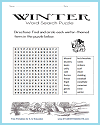| Solar System Information |
|---|
| www.studenthandouts.com ↣ Science ↣ Lower Elementary ↣ Astronomy |
|
The stars of the heavens are of several kinds. They are visible in the darkness of the night because they are continually sending forth rays of light in every direction. All of them, together with the earth and the whole material creation, are known as the universe. Most of the stars shine with a light of their own and appear to remain from year to year in the same position with respect to one another; hence they are called fixed stars. The sun is one of the fixed stars. Many of the stars are larger than the sun, but they all appear to us smaller because they are more distant from our earth than the sun is. A number of other "stars" revolve around the sun. These are dark themselves and shine only by the reflected light of the sun. As they appear to us to move about among the fixed stars, they are called planets (from the Greek planetes, a "wanderer"). Moons, or satellites, are bodies which revolve around a planet. Besides planets and moons, there are other bodies which revolve around the sun or wander in space; such are the comets and meteoroids. The paths which the planets describe in revolving around the sun are nearly circular. The paths of comets are elongated, or elliptical. The paths of planets and comets are called their orbits. The sun, together with the planets, moons, and other bodies that move around it and receive from it light and heat, constitute the solar system. There are eight large, and several hundred smaller, planets. The latter are called asteroids, and their orbits are all close together. The large planets are: 1. Mercury 2. Venus 3. Earth 4. Mars 5. Jupiter 6. Saturn 7. Uranus 8. Neptune A mnemonic device (memory trick) for remembering the names and order of the planets is: My Very Elegant Mother Just Sent Us Napkins Until fairly recently, there was a ninth planet—Pluto. But scientists concluded that Pluto is too small, and its orbit too skewed, for it to be considered a planet. |
 |  |  |  |  |
| www.studenthandouts.com ↣ Science ↣ Lower Elementary ↣ Astronomy |














































